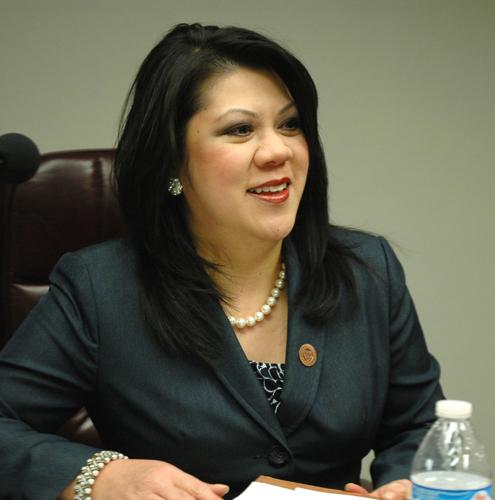Gov. Doug Ducey says he believes in First Amendment rights for high school journalists, but only if they are supervised — and can be overridden — by school principals and administrators.
“I’m a believer of course in free speech and have been supportive of the First Amendment,” the governor told Capitol Media Services on Tuesday, less than 24 hours after vetoing legislation that would have limited the ability of school officials to censor what their students write. But Ducey said there are limits to those constitutional rights.
“These are minors,” he said.
“We believe that some supervision and making certain that the principal is in charge of a school and the school’s direction is important,” Ducey continued. “And that’s what resulted in the veto.”
The governor’s move disappointed Sen. Kimberly Yee, R-Phoenix — and not only because she shepherded her legislation through the Senate without any dissent and picked up 41 votes in support in the 60-member House.
People are also reading…
It was Yee’s personal experience as a student journalist in 1991 at Greenway High School in Phoenix, having her stories and cartoons quashed by administrators, that first sparked her interest. In fact, she even convinced the state Senate the following year to enact legislation protecting student publication rights.
That 1992 measure died when it could not clear the House. So Yee, now the Senate majority leader, decided it was time to try again.
“I know Kimberly’s history on this personally,” Ducey said. But “that happened over 20 years ago.”
Nor was the governor persuaded by the reporting done earlier this year by students at Pittsburg High School in Kansas who found out that advanced degrees claimed by their new principal came from a university that apparently was not accredited. She subsequently quit.
“I’m certainly aware of the Kansas issue,” Ducey said. “But I don’t know we need to be solving Kansas issues in Arizona.”
But there was testimony earlier this year that there is a problem in Arizona, not just from student journalists but also faculty.
Peggy Gregory, who advises the student paper at Greenway High School, told lawmakers about an incident where students were working on a news story about a testing program the district liked. That article, she said, quoted a teacher who was critical of that testing.
Gregory said the school superintendent instructed the principal to tell her to kill the story — or lose her job. Censorship aside, Gregory said these kinds of situations undermine what she and other journalism teachers are trying to teach.
“If they’re only allowed to publish puff pieces, how will they ever learn the power of the press to bring about change, to challenge ideas, to take the responsibility of their words, and to take up the mantle of the great journalists who have preceded them?” she asked.
“We don’t want administration to censor stuff,” the governor said. “These kids enjoy the same First Amendment rights that you and I do.”
Well, not exactly.
In 1969, the U.S. Supreme Court declared that student press freedom was protected by the First Amendment. But in 1988 the court partly reversed itself, ruling that public school newspapers do not have the same level of constitutional rights as other publications.
The bottom line, Ducey said, is his belief there needs to be someone to second-guess the judgment of writers who could be as young as 14.
“We just wanted to make sure there would be adult supervision and that we wouldn’t strip teachers or principals of authority,” the governor said.
“That is the misperception of how journalism works in schools,” Yee said.
“Of course there is adult supervision,” she continued. “You have a certified teacher as the journalism adviser and you often have an assistant, who is also an adult.”
And Yee insisted that the language of her legislation was broad enough to give some oversight even to principals and school officials.
As approved, her legislation required each school governing board to adopt “written content standards or guidelines for school-sponsored media.” And the measure allowed school officials to kill stories that create imminent danger of inciting students to violate the law or district regulations “or materially and substantially disrupts the orderly operation of the public school.”
Yee said those provisions likely would have given administrators the ability to quash even embarrassing stories.
She said that language resulted in the Arizona School Boards Association deciding not to try to kill the legislation. But ASBA lobbyist Chris Kotterman said many local board members still had concerns.
“It would hamper their ability to prevent the publication of material that they thought was problematic,” he said. “And that is their right under the (1988 Supreme Court) case.”
The easiest thing to do, Kotterman said, was simply stay out of the fight.
Ducey said he’s willing to consider a similar bill next year — but only if its scope is limited.
“If this had been something for college students or above it would have been an easy signature,” he said.
On Twitter: @azcapmedia









